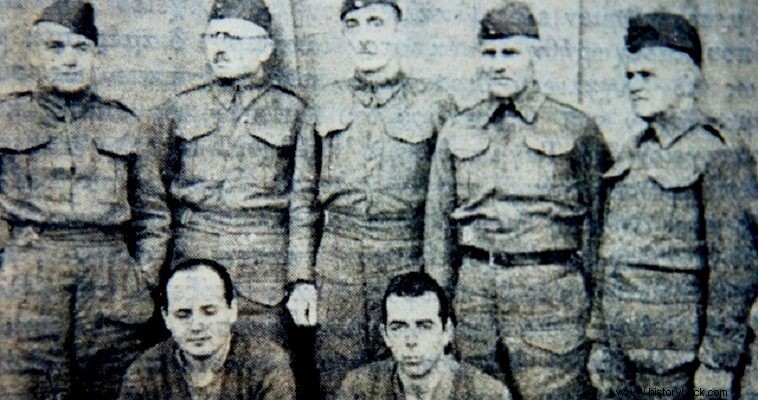
Georgios Tsolakoglou, from the moment he took over as occupying prime minister, made sure to pursue the Metaxikis. Among them was the commander-in-chief of 1940-41, Lieutenant General Alexandros Papagos.
By order of Tsolakoglou, the infamous "Katheniotis Report" was drawn up. The main accusation attributed to Papagos was that he "did not prevent the declaration of war against the Axis , whom he organized handily"... Later, in a move to reach out to Papagos, Tsolakoglou thought of giving him an honorary pension. But Papagos refused to accept anything.
Organization and Conception
Papagos remained under house arrest until 1943. When the surveillance was relaxed, on May 20, 1943, Papagos invited to his house lieutenant generals Ioannis Pitsikas, Dimitrios Papadopoulos, Panagiotis Dede, Georgios Kosmas, Marcos Drakos and Konstantinos Bakopoulos. , all of them with rich action in 1940-41.
Everyone went outside the Dragon, due to a personal problem. But he also signed, later, the founding act of the "Military Hierarchy" organization they founded.
The organization made contact with other officers and began to grow. The lieutenant generals gathered every 8 – 10 days. However, as Lieutenant General Bakopoulos reports, the Germans were informed of the events by "some bad Greeks". So on July 25, 1943, at 05.30 in the morning, five lieutenant generals were arrested in parallel operations by the Germans.
In Germany
After they were taken to the GESTAPO headquarters, their homes were searched. Finally, Papagos, Bakopoulos, Pitsikas, Dedes and Kosmas were arrested. The Greek lieutenant generals were taken to Thessaloniki and from there to Bohemia, in occupied Czechoslovakia, to Königstein, a concentration camp for senior military prisoners. Forty-five French and five Dutch high-ranking officers were held there.
On September 21, however, the Greek generals were transferred from there to the Sachsenhausen concentration camp in Oranienburg, Berlin. The "dangerous" prisoners were taken there. Austrian ex-chancellor Schussing was also held there, along with Soviet, Polish and British officers.
On October 28, however, the imprisoned and heavily guarded Greeks (they were guarded by an entire SS platoon) decided to celebrate the historic anniversary with a few chocolates and a little wine that they found by bribing a guard.
The corporal, the soldier and Papagos the cook
In November, at the request of Papagos, two Greek prisoners of the Italians, Corporal Nikolaos Grivas from Piraeus and the soldier Vassilios Dimitriou from Athens , who were sent to the same ward as the generals. With Griva's help, Papagos cooked from the food sent by the Red Cross, to strengthen the meager rations. The only entertainment of the Greeks was the bombing of Berlin by the British air force...
Life was difficult in the camp. On June 6, 1944, the Greeks were informed of the landing in Normandy with satisfaction. But their adventure would still be long overdue. Later they were informed of the liberation of the homeland, and the December movement, but also with concern they were informed of the establishment of a "Macedonian state" with Skopje as its capital, by Tito, realizing, already THEN, what this meant.
From camp to camp and freedom...
On March 25, 1945, the Greeks celebrated the national anniversary. At the beginning of April, however, the Greeks were first transferred to the Floselburg camp, then to the infamous Dachau and finally to Innsbruck in Austria. In this horrible camp they met three other Greek prisoners, Sofronopoulos, Vassos and Orfanoyiannis , in awful condition. Unfortunately, the generals were also fasting and had nothing to offer them.
They were later transferred to Tyrol. Only on April 30 did the German guards relax their stance, having also learned of Hitler's suicide. On May 4, liberation by American troops finally came. Ten days later the small group of seven Greeks returned home...
